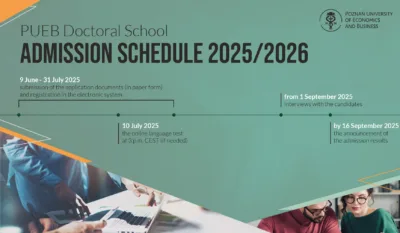The Director’s powers in terms of organising and executing the teaching process are
as follows:
1) developing a draft curriculum of the Doctoral School and draft staffing for the
courses,
2) arranging courses in accordance with the curriculum, including cooperation with the
University administration in order to ensure appropriate teaching facilities,
3) supervising the delivery of courses,
4) reviewing (every semester) the execution of the curriculum and the individual
research plans of individual doctoral students based on the interim progress reports
submitted by the doctoral students and the feedback from the supervisor(s),
5) performing other tasks as specified in these Rules and Regulations
The basic tasks of the Doctoral School Office include:
1) Organisational and technical support for the Doctoral School Director and the Doctoral School Council;
2) Support for commissions conducting the mid-term evaluation of the implementation of the doctoral students’ individual research plans;
3) Keeping the documentation concerning doctoral education;
4) Handling the admissions process for the Doctoral School;
5) Keeping the documentation covering the whole process of education of the doctoral students;
6) Ongoing support for doctoral students, particularly in the form of: giving them the necessary information, assisting them in the course of education, preparing draft decisions on the matters of individual doctoral students, to be further processed by relevant University organs;
7) Keeping a register of doctoral students in the University’s electronic system;
8) Issuing certificates related to the doctoral students’ education;
9) Issuing duplicates of documents for doctoral students;
10) Handling the international relations of the University, including benefits for doctoral students and the cost settlement of the doctoral students’ visits at universities abroad;
11) The preparation of issues concerning doctoral students for the Senate sessions, including accepting and processing applications to be submitted to the Senate for its opinion, or decision;
12) Handling matters related to staffing classes, including the preparation of the schedules of classes for the given academic year;
13) managing the Office’s property;
14) cooperation with the Academic Advancement Board and other organisational units of the University;
15) preparation of the required reports;
16) filing requests for purchases for the Office – devices, equipment, office materials, cleaning products, etc., – in compliance with the public procurement procedures.







